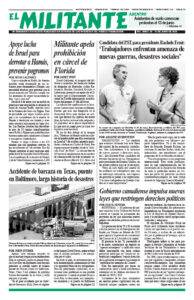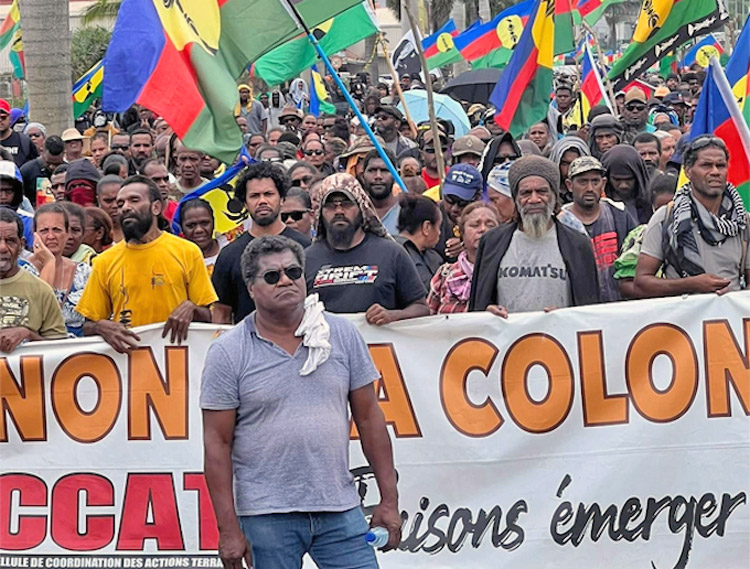SYDNEY — Over the past six months, Kanaks and other supporters of independence in New Caledonia, a French colony and Pacific island nation east of Australia and north of New Zealand, have staged protests. They are opposing moves by Paris to impose new election laws that would help to seat a pro-Paris government later this year. French police and troop presence on the island has been increased in response.
When the legislation went to France’s National Assembly May 13, protesters erected barricades on major roads in New Caledonia, paralyzing its capital, Noumea, and elsewhere on the island. Members of the Kanak and Exploited Workers Union (USTKE) struck for 24 hours at Noumea’s airport and port. In the midst of these protests, riots and looting broke out, causing extensive damage. Cars, shops, businesses and public buildings were set on fire.
Paris declared a state of emergency. Another 1,000 French soldiers and police were sent to the colony to reinforce the 1,700 already there.
Pro-independence parties that had organized peaceful protests condemned the riots. The USTKE stated that it “understands the great frustration, legitimate as it may be … but strongly deplores the recent vandalism and destruction.” It added, “Behind these burnt and destroyed businesses, it is also employees, mothers and fathers of the country, many of our families who are losing their jobs and their wages.”
French President Emmanuel Macron flew into Noumea May 23 to announce his government would delay changing the voting law. He left 18 hours later, with barricades still up in the capital and elsewhere.
New Caledonia was annexed by France in 1853 as European colonial powers competed for colonies in the Pacific. Indigenous Kanaks make up 40% of the population of 270,000. French Europeans, comprising 25%, include families that have lived there since the 19th century, as well as recent arrivals and temporary residents. Polynesians from France’s other Pacific colonies make up another 11%, as do those of mixed race.
Kanak fight for independence
In the 1980s Kanaks waged a deep-going fight for greater equality and independence from colonial rule. Despite violent repression, Paris was unable to crush the struggle and was forced to make significant concessions.
The Matignon Accords of 1988 set political reforms with greater political representation to Kanaks. Three provinces were created, two with Kanak majorities, gaining self-rule for first time.
The Noumea Accord 10 years later granted greater autonomy from France, promising independence referendums in 20 years’ time. Voting in local elections and in the referendums was restricted to those resident in New Caledonia prior to 1998, and their descendants.
The vote for independence increased from 43% in the 2018 referendum to 47% in 2020. The third vote in 2021 took place amid the COVID pandemic as campaigning was restricted. When Paris refused a request to postpone the poll, the pro-independence parties boycotted it. The turnout was only 44%.
Macron proclaimed this a decisive victory for France. Speaking to a rally in Noumea in 2023 that Kanaks boycotted, he declared the independence issue had been settled with “no turning back.”
Since 2021 pro-independence parties have been a majority in the national government elected by New Caledonia’s parliament. The presidents of the government and the Congress are both members of Kanak independence parties. The Congress itself is almost equally divided between pro- and anti-independence parties.
In March the French government postponed New Caledonia’s provincial elections due in May. It pushed ahead with amendments to the French Constitution to extend voting rights to all French nationals who have been residents of New Caledonia for 10 years. This would add 25,000 to the electoral rolls and increase the anti-independence vote.
Since late last year, thousands in the streets have demanded, “No to unfreezing the electoral laws. No to recolonization!” Many leaders of this campaign are now under house arrest.
Only 3% of Kanaks get an education past high school, compared to 23% for the rest of the population. The jobless rate for Kanaks is 38%, four times that for others. They make up 90% of the prison population.
The mining and processing of nickel is a major industry in New Caledonia, the world’s third-largest producer. Macron calls it “a major strategic resource for France and Europe.” He wants to lift limits on the export of unprocessed ore, which pro-independence parties say will undercut local processing and jobs. Paris is also demanding that there be preference for nickel exports to Europe.
Half of the nickel industry jobs are held by Kanaks, but the price of the metal fell 40% on the world market last year and layoffs are threatened.
This crisis is a blow to what the French government calls its Indo-Pacific strategy, which it says counters “China’s increasing power and territorial claims, as well as the global competition underway with the United States.”
There are French colonies in the Caribbean, Indian Ocean, South Pacific and elsewhere, claimed as French soil. As military tensions heat up in the region, with Washington and Canberra, Tokyo and London all seeking to counter Beijing’s influence, Paris seeks to assert its place as an Indo-Pacific power using its colonies in French Polynesia, New Caledonia and Reunion, and its naval, air, and military bases there.
Last December, Paris hosted the South Pacific Defence Ministers Meeting in Noumea. The main pro-independence party, the Kanak Socialist National Liberation Front, condemned the summit, saying, “France is using the meeting to present our country as an ‘aircraft carrier’” as it “seeks to expand its presence in the region.”


